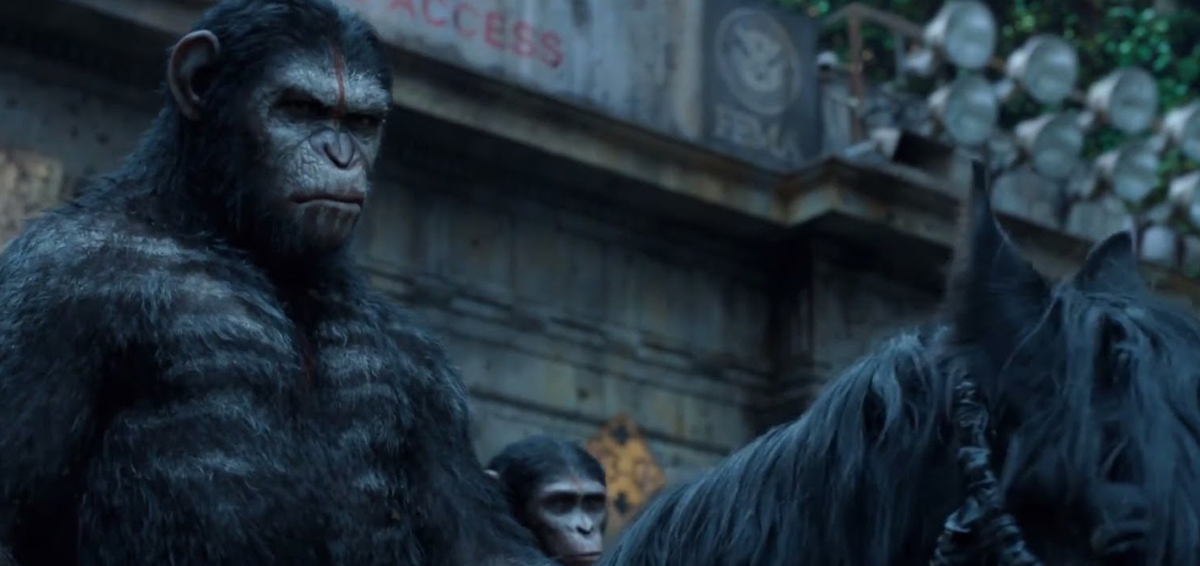
A prequel seemed like the natural next step for the Planet of the Apes series after a virile Charlton Heston damned us all to hell for dismounting Lady Liberty in the original film. But by the time the series got to that stage, and the producers finally thought to look backwards rather than forward, it was too late – the POTA series had faded into B-movie banality, giving us the promising but undercooked Conquest of the Planet of the Apes in 1972. 2010’s Rise of the Planet of the Apes was the prequel done well, a CGI rehash of Conquest with a slightly tweaked sense of social consciousness. Sure there were casting problems, but that didn’t take away from that film’s really promising sense of originality and its understated intelligence.
The newest in the series, Dawn of the Planet of the Apes is also a remake of sorts, this time rejigging the original series’ finale Battle for the Planet of the Apes – which was also a critical and commercial failure at the time. Dawn focuses on Cesar, who came of age in Rise and who now leads a forest-bound village of evolving apes. Problems arise though when the apes come across a community of struggling humans who have survived the “simian flu” that destroyed the world, and are now huddled up in a San Francisco tower-cum-stronghold led by Malcolm (Jason Clarke) and Dreyfus (Gary Oldman).
It’s a relatively straightforward story and you won’t be surprised by any plot developments. In some ways, the inevitability of the series is a good thing for a film of this scale, as, in theory, it opens up opportunities to look beyond exposition and narrative, and instead focus in on character interactions. Having said that though, the most empathetic relationships here mostly exist between non-humans, with Andy Serkis and Toby Kebbell creating astonishingly realistic apes who tussle over leadership and direction. It’s a credit to the performances as well as the technology that the apes are realistic not only in their borderline-immaculate appearance but also in their emotional performances and body language.
The humans, by comparison, are straight up boring and underwritten. Clarke, Keri Russell (of The Americans fame) and a pubescent Kodi Smit-McPhee make up the dull central family, but, luckily, Reeves gives equal credence to both human and ape communities, so these dreary humans don’t bog down the film too much. Gary ‘The Dickhead’ Oldman plays the film’s chief dickhead Dreyfus, venting some of his own deep-seated intolerance, in his desire to annihilate the ape population. This is all a bit commonplace for Oldman now, who plays a slightly more conflicted version of the over-the-top villains he played in the 90s.
Matt Reeves (Cloverfield) takes over directing duties from Rupert Wyatt, and he brings his trademark murkiness to what was once a relatively campy series. In that sense, Dawn comes off as more refined than its predecessors, as it nails down a dark, ominous tone, creating some stunning nocturnal set pieces. The landscapes too are consistently impressive, particularly the jungle village and the urban fortress. It’s all quite self-conscious though, not taking any risks or pushing the envelope the way the original did. Which isn’t to say the original was a fantastic movie, nor was it as clever as it thought it was, but it was successful (and influential) because it justified its concept with quite a lot of detail and discussion.
Unfortunately, the end product here feels quite hollow, and that’s because Dawn doesn’t really have anything new to say. While previous Planet of the Apes films focused – albeit heavy-handedly – on ideas of genetic experimentation, and science verses religious fundamentalism, Dawn does away with undertones and implications in a way that is a bit of a discredit to the core ideas of the series. Rise by comparison, struck a much more effective balance between sentimentality, action, and intelligence – the central themes here only extend as far as ‘we should all try and get along’.
Most of these problems just come down to a weak script, which explains why the best moments in this film are effectively silent and are usually contingent upon Andy Serkis working his magic. In that sense, it’s really hard to fault the performance capture or the visuals effects in the film, as Serkis and co are undeniably brilliant as the hardened apes, giving life to an otherwise barren story. As a prequel, Dawn gets from point A to point B, but it does so feeling more like a derivative means to an end than a solid film in and of itself.
Around the Staff:
| Felix Hubble |
